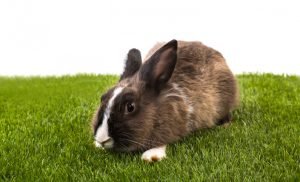As temperatures continue to drop, pet owners everywhere are worried about how to provide the best care for their beloved pets. For those of us with rabbits in our families, it can be especially worrying as colder temperatures pose a serious risk to these furry friends.
Knowing what temperature is too cold for your rabbit is an important part of being a responsible pet owner and ensuring your little one stays safe and healthy this winter season.
In this blog post, we’ll discuss proper rabbit temperature needs, signs that your bunny may be getting too cold, and tips on keeping them warm during the chillier months. Read on if you want to keep your pettable family member happy and comfortable into springtime!
What temperatures can rabbits tolerate?
Rabbits are fascinating animals that have adapted to different weather conditions. These adorable creatures can tolerate a wide range of temperatures, but they do have their limits.
Generally, rabbits are comfortable in temperatures between 60-70°F, but they can tolerate temperatures as high as 90°F. On the other hand, they can also withstand colder temperatures, but below 20°F, they may require additional insulation to stay warm.
It’s important to monitor the temperature in your rabbit’s living space to make sure they remain healthy and comfortable, especially during extreme weather conditions. With some care and attention, you can ensure that your furry friend stays happy and healthy all year round.
Can bunny rabbits survive the cold?
While bunny rabbits may seem like delicate creatures, they are quite resilient when it comes to surviving the cold. These adorable animals have adapted to living in various climates, including snowy environments.
However, it’s important to note that wild rabbits have different survival techniques than domesticated ones. Wild rabbits often burrow underground for warmth, while domesticated rabbits need extra insulation in their shelter, such as plenty of hay and a cozy box to hide in.
Additionally, providing your bunny with plenty of food and water is crucial during the winter months to maintain its body heat. With proper care and attention, bunny rabbits can thrive, even in colder weather conditions.
How do I know if my rabbit is cold?
If you’re a new rabbit owner, it’s natural to be concerned about your furry friend’s comfort. One thing that may cross your mind is whether or not your rabbit is feeling cold.
Rabbits are sensitive to temperature changes, and you may notice that they become more lethargic or snuggly when they’re feeling chilly. Other signs that your rabbit may be cold include shivering or hiding away in a cozy spot. Keeping your rabbit’s living area at a comfortable temperature and providing them with plenty of blankets and nesting material can help ensure that they stay warm and cozy.
By paying attention to your bunny’s behavior and making adjustments to their living quarters as needed, you can help keep your rabbit comfortable and healthy all year round.
How do you warm up a cold rabbit?
When it comes to warming up a cold rabbit, the first step is to bring them inside to a warm, dry area. It’s important to avoid placing them near direct heat such as a radiator or heater, as sudden temperature changes can be harmful to rabbits.
Instead, wrap your furry friend in a blanket or towel and hold them close to your body to transfer your warmth. You can also place a warm water bottle wrapped in a towel near them, as the warmth will help increase their body temperature.
Keep a close eye on your rabbit as they warm up to ensure they are comfortable and gradually increase their activity level. With a little care and patience, your cold rabbit will be warm and cozy in no time!
How do I keep my rabbit warm at night?
Rabbits are cute, furry creatures that make great pets, but they can be sensitive to changes in temperature. Keeping your rabbit warm at night is essential to its health and well-being. One way to ensure that your bunny stays cozy is by providing them with a suitable shelter.
A hutch lined with a layer of hay or straw can act as insulation, trapping warmth inside. Additionally, providing your rabbit with a warm blanket or rug can also help keep them snug.
It’s important to remember that rabbits are social animals, so allowing them to snuggle up with a furry companion or sleep near a heat source, such as a radiator or heated pad, can provide extra warmth and comfort.
Keeping your rabbit warm at night is crucial to preventing illnesses and ensuring they have a happy and healthy life.
How can I tell if my rabbit is too hot?
As temperatures rise, it’s important to keep a watchful eye on our furry friends. Rabbits are particularly susceptible to overheating and heatstroke, but fortunately, there are a few signs to look out for to ensure your pet stays safe and healthy.
One key indicator of overheating is excessive panting, as rabbits typically only pant when they’re in distress or feeling too warm. Your rabbit may also begin to act lethargic or sluggish or have trouble breathing. To prevent overheating, be sure to provide plenty of shade and cool water, and avoid leaving your rabbit in direct sunlight for extended periods.
As always, it’s best to err on the side of caution and seek medical attention if you suspect your pet is experiencing heatstroke.
Can I spray my rabbit with water?
If you’re a rabbit owner, you may be wondering if it’s okay to use water as a disciplinary tactic. While it may be tempting to grab a spray bottle to correct your bunny’s behavior, it’s important to understand the potential consequences.
Rabbits are naturally clean animals, and getting sprayed with water can be stressful and unpleasant for them. Additionally, consistent use of water as punishment can damage the trust and bond between you and your furry companion.
Rather than using water, try positive reinforcement methods such as treats or gentle redirection to encourage good behavior. Remember, a happy and healthy rabbit feels loved and respected by its owner.
Do rabbits need air conditioning?
As temperatures begin to soar during the summer months, many pet owners may start to wonder how their furry friends are managing in the heat. For rabbit owners, the question arises: do rabbits need air conditioning?
While rabbits are well-adapted to handling moderate heat, extreme temperatures can be dangerous for them.
These pets require fresh air and a cool environment to avoid heatstroke, which could be fatal in severe cases. Although they are capable of regulating their body temperature to a certain extent, some rabbits may struggle with extremely hot weather. Therefore, it is advisable to provide them with a cool and shaded area with plenty of air circulation, such as a well-ventilated room with a fan or air conditioning system.
After all, nothing is more important than keeping our furry friends safe and comfortable.
Can baby rabbits live outside in winter?
Many people might wonder whether baby rabbits can survive the harsh winter weather if left outside. While rabbits do have fur to keep them warm, they might not be able to fend off extreme temperatures without help. It is essential to provide them with a warm, dry, and well-insulated shelter if you decide to keep them outdoors.
Additionally, ensure they have plenty of fresh water and hay to eat to keep themselves hydrated and their bodies adequately fueled to generate heat. If you’re unsure about their ability to withstand the cold temperature, it’s best to bring them inside during the coldest months or limit their exposure to the outdoors.
At what age can baby rabbits go outside?
Baby rabbits, also known as kits, are adorable critters that captivate many with their small size and fuzzy appearance. However, when it comes to the question of when they can go outside, it’s important to consider a few things.
While baby rabbits can start venturing outside as early as three weeks old, it’s recommended to wait until they’re at least eight weeks old before allowing them to explore the great outdoors. By this age, their immune system will be stronger and they’ll have developed the necessary skills to survive in the wild.
Additionally, it’s important to ensure they have a safe and secure outdoor environment where they can play and exercise without the risk of predators or other dangers. So, though it may be tempting to show off your adorable new pet, it’s best to exercise patience and wait until they’re ready to safely enjoy the great outdoors.
Can baby bunnies be in direct sunlight?
Baby bunnies are undeniably adorable and delicate creatures. As pet owners, we want to make sure that our furry friends are always kept safe and healthy.
One of the important things to consider when taking care of baby bunnies is their exposure to sunlight. While it is true that rabbits can catch some rays, it is important to be mindful of the amount of time they spend under direct sunlight.
Acclimation is key, as shifting them immediately from indoor living to the great outdoors can cause severe sunburn and dehydration. Therefore, it is best to gradually introduce them to the sun by taking them for brief and shaded periods at first, and then gradually increasing their time spent in direct sunlight.
With a proper introduction, we can ensure that our little bunnies can enjoy the great outdoors to the fullest while remaining happy and healthy.
Do baby bunnies need to be in the dark?
Baby bunnies are delicate little creatures that require special care to ensure their health and well-being. When it comes to light exposure, there is some debate on whether or not they need to be in the dark.
While some people believe that keeping them in a dark environment can help them to relax and feel safe, others argue that they need some exposure to natural light to develop properly.
Ultimately, it is important to strike a balance between providing enough light for their development and ensuring that they have a cozy, comfortable space to rest and grow in. So, whether you opt for a dimly lit environment or a sunlit enclosure, be sure to monitor your baby bunnies closely to ensure that they are thriving and happy.
How long will a mother rabbit leave her babies?
As a mother rabbit, it’s instinctual to protect and care for her babies. However, that doesn’t mean she’ll be by their side at all times. Mother rabbits will often leave their babies alone for extended periods throughout the day.
Generally, a mother rabbit will leave her babies for several hours at a time, usually between five to eight hours in total. While it may seem concerning to some, it’s actually for the benefit of the baby rabbits. This alone time helps them learn to be independent and self-sufficient, which is crucial for their growth and development.
So the next time you see a mother rabbit out and about without her babies in tow, know that it’s a natural and necessary part of their upbringing.
Can baby bunnies survive in rain?
Have you ever wondered if baby bunnies can survive in the rain? While rabbits are known for their ability to withstand cold temperatures, rain can pose a threat to their survival, especially for newborn bunnies.
Unlike adult rabbits, baby bunnies (also known as kits) do not have fully developed fur or the ability to regulate their body temperature effectively. As a result, prolonged exposure to rain can cause hypothermia, dehydration, and even death. However, if provided with proper shelter and warmth, baby bunnies can survive the occasional rain shower.
So next time it rains, keep an eye out for any little ones that may need some extra protection.
Can rabbits live outside all year round?
Rabbits are known to be hardy animals, but can they survive outside all year round?
While they may be able to withstand cooler temperatures, extreme heat and cold can be detrimental to their health. Rabbits also need a safe and secure outdoor enclosure that protects them from predators and offers shelter from the elements.
It’s important to do your research and ensure your rabbit’s outdoor living conditions are appropriate for its specific breed and climate. By providing proper care and attention, rabbits can thrive outdoors and enjoy a healthy, happy life.
What is the lifespan of a pet rabbit?
For those thinking about adopting a pet rabbit, it’s important to understand their lifespan. On average, domestic rabbits live anywhere from 8-12 years. However, it’s important to note that some rabbits can live up to 15 years with proper care and nutrition.
While rabbits are known for their adorable and playful personalities, they do require a lot of attention and specific care. Ensuring your rabbit has a balanced diet and access to exercise can help make sure they live a long and healthy life. It’s essential to research and prepares before adopting a pet rabbit to give them the best life possible.
Do indoor rabbits live longer?
Rabbits make wonderful pets, and for many who choose to keep them, they quickly become a part of the family. And with that comes the question of how long they will be able to enjoy their furry companion’s company.
Indoor rabbits, as it turns out, do have the potential to live longer than their outdoor counterparts. There are various reasons for this, including reduced exposure to predators, extreme temperatures, and disease, as well as access to a more consistent diet and veterinary care.
Of course, the lifespan of any pet can vary greatly depending on its health, genetics, and environment. But providing a safe, comfortable indoor space for your bunny friend increases their odds of a long and happy life.
What’s the oldest rabbit to live?
Rabbits make great pets, but have you ever wondered how long they can live? Well, the oldest rabbit on record was a bunny named Jasper who lived to be 16 years and eight months old! That’s over twice the average lifespan for a pet rabbit.
Jasper was a special rabbit though, as he was a dwarf breed and stayed active and healthy throughout his long life. He lived in the UK with his owner and was even featured on a TV show during his golden years. It just goes to show that with good care and love, rabbits can have long and happy lives.
In Summary: How cold is too cold for a pet rabbit?
Owning a pet rabbit is a responsibility and knowing the difference between too cold and comfortable temperatures for our furry friends should be a top priority.
We must remember that temperature preferences vary depending on breed, age, overall health, fur type, and environment. And while all rabbits have their own needs—the basics are simple: make sure your bunny is living in temperatures between 32 to 68 degrees Fahrenheit.
Anything below or above can lead to serious health risks like hypothermia and heatstroke. Though it may not always be possible to meet ideal temperatures, we can still provide extra protection through blankets, heated indoor areas, or even safe outdoor enclosures to keep your bunny snuggled warm during cool days.
Keeping up with these easy but essential tips will guarantee the safety of your beloved little hopping friend for many years to come!



